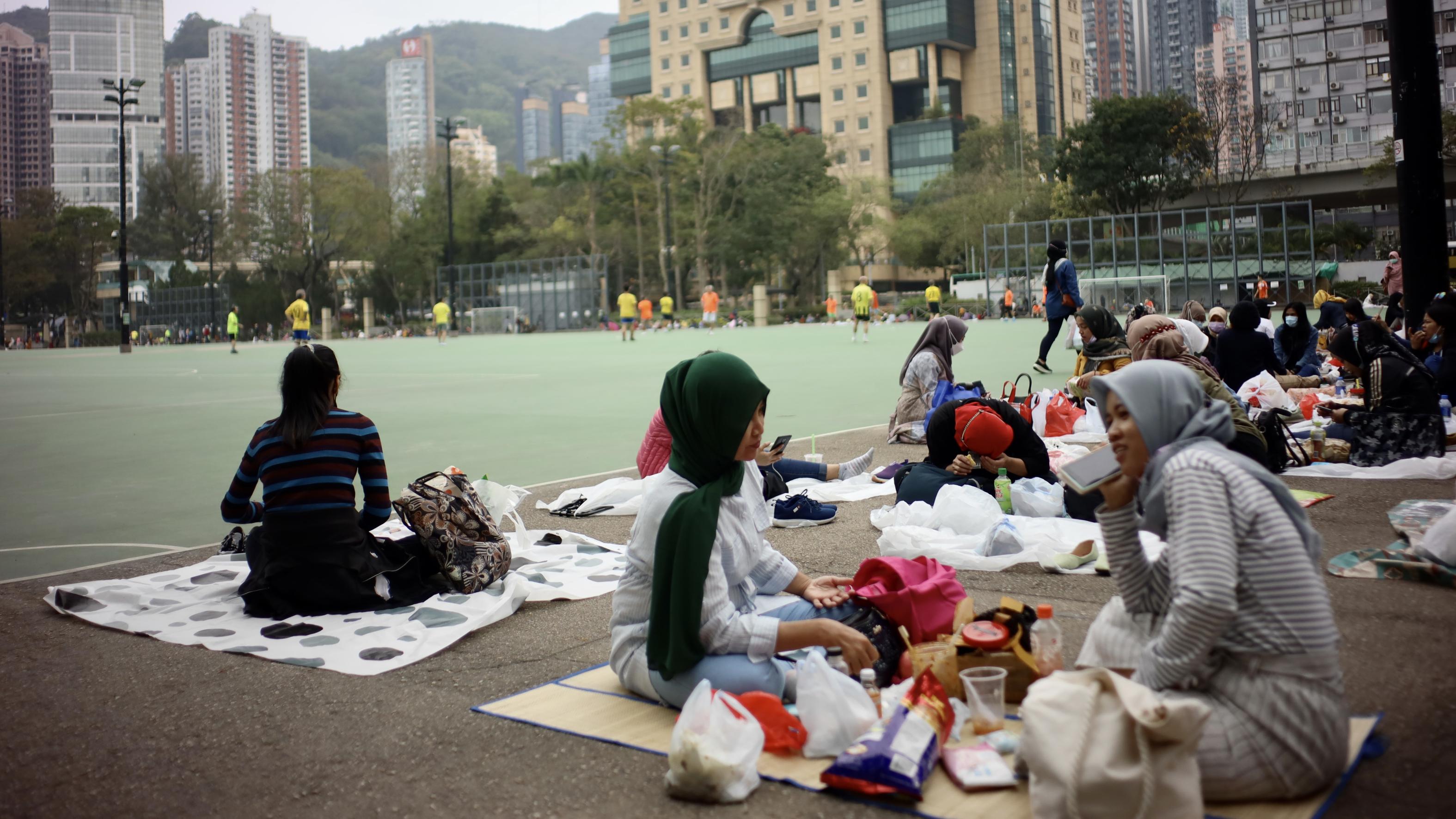 A photo taken on March 15, 2021 shows foreign domestic helpers gathering at Victoria Park, in Causeway Bay, Hong Kong. (EDMOND TANG / CHINA DAILY)
A photo taken on March 15, 2021 shows foreign domestic helpers gathering at Victoria Park, in Causeway Bay, Hong Kong. (EDMOND TANG / CHINA DAILY)
Hong Kong families may have to pay an additional HK$5,000 ($640) to hire each Indonesian domestic helper as the government in Jakarta considers passing on all employment costs to employers. The policy change is expected to affect many as 41 percent of the city’s 338,000 domestic helpers are from Indonesia.
The “Zero Placement Fee” policy, first announced in 2020 by the Indonesian government, requires overseas employers to cover all expenses incurred when hiring Indonesian domestic workers.
This includes airfares, visas, passport replacement, medical examinations, transportation, and accommodation expenses. The total cost of hiring a helper from Indonesia could be HK$20,000, up from over HK$10,000.
Speaking on a radio program on Thursday, Thomas Chan Tungfung, chairman of the Hong Kong Union of Employment Agencies, said up to 30 percent of employers planning to hire Indonesian helpers may look to other countries
The policy was originally slated to take effect in January 2021.
On Wednesday, representatives of Indonesian recruitment association Aspataki, under the authorization of Indonesia’s National Board for the Placement and Protection of Indonesian Overseas Workers, held a news briefing in Hong Kong to explain the policy change to Hong Kong-based agencies.
Indonesian officials are expected to visit the city this month to publicize enforcement of the policy change.
Speaking on a radio program on Thursday, Thomas Chan Tungfung, chairman of the Hong Kong Union of Employment Agencies, said up to 30 percent of employers planning to hire Indonesian helpers may look to other countries. Chan said the Indonesian government is highly likely to implement the new policy, adding that he expects it will be applied to new contracts signed after two weeks.
ALSO READ: Eased testing rules for helpers coming to Hong Kong kick in
Chan also said this could drive up the wages of locally contracted Indonesian domestic workers, from the current statutory monthly minimum wage of HK$4,730 to at least HK$6,000.
Chan said he believes this decision will not affect Indonesian helpers already contracted in Hong Kong. Hence, some families might seek to hire locally contracted ones instead of new ones through overseas recruitments, he said.
Chan said that most Indonesian helpers can speak Cantonese, and despite the increased cost, they would retain their appeal for families who need help in caring for elderly people.
Betty Yung Ma Shan-yee, chairwoman of the Hong Kong Employers of Overseas Domestic Helpers Association, said she worries there may be demands for employers to pay additional fees in the future or moves encouraging other countries to follow in Indonesia’s footsteps.
ALSO READ: Helpers' minimum wage, food allowance to go up in HK
Yung said that as Hong Kong employers already foot the bill for contracts and visas, there are concerns that Indonesian agencies are taking advantage of the high demand for Indonesian domestic workers in Hong Kong and charging both workers and Hong Kong employers excessive fees.
Chloe Wang, who works in the education industry and has hired an Indonesian helper for the past 18 months, told China Daily that employers currently need to pay an agency fee of over HK$10,000 before they can hire a helper.
“There is no need to indulge Indonesia’s unilateral demands. If we need to pay an extra HK$5,000, I may consider not hiring an Indonesian helper,” Wang said, adding that the Hong Kong Special Administrative Region government should take control over continuously rising prices in the foreign domestic worker market and set detailed regulations. If the prices continue to increase, it would be more practical to hire part-time workers, she said.
When asked if she feared other countries would follow in Indonesia’s footsteps, Linda Hu, a 55-year-old insurance agent who currently has a Filipino helper, said she wasn’t worried as there is no global shortage of labor, and it is possible to find domestic workers from countries that do not force employers to pay all the fees involved in the hiring process.
Mike Wong contributed to the story.


